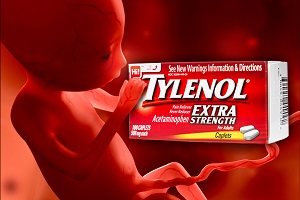
Acetaminophen (Tylenol®) is safe to use during pregnancy, right? Is it safe to take anytime you need pain relief or have a headache? I will show you that acetaminophen is a potentially dangerous drug. Most health care providers are not knowledgeable about what acetaminophen actually does in the body.
If you go on the website for Tylenol® (www.Tylenol.com) you see pictures of smiling, young women holding their happy babies. It would appear from these pictures that it is perfectly safe for anyone to take acetaminophen. To be fair, if you dig into the safety and pregnancy link, it says that before a pregnant woman takes Tylenol® she should consult her doctor. However, I would venture to guess that most doctors would say it is safe to take acetaminophen during pregnancy. Nothing could be farther from the truth. A recent study (1) looked at the toxicity of acetaminophen use during pregnancy. The researchers studied 48,631 children whose mothers filled out a questionnaire about their use of acetaminophen during pregnancy.
Within this group, there were 2,919 same-sex sibling pairs who were used to adjust for confounding factors. The analysis of the data found that three-year-old children exposed to prenatal acetaminophen for more than 28 days, as compared to children exposed to acetaminophen less than 28 days and those not exposed, had significant declines in gross motor development, externalizing behavior, internalizing behavior, and higher activity levels. The researchers state, “In clinical terms, these results suggest that exposure to {acetaminophen} for more than 28 days during fetal life increases the risk of adverse psychomotor and behavioral outcomes by almost 70% and doubles the risk of language problems in 3-year old children.”
Is acetaminophen safe during pregnancy?
To answer this question it is important to know what acetaminophen does in the body. Acetaminophen depletes glutathione in the body. Glutathione is the main enzyme that aids the body in detoxification. The antidote for acetaminophen toxicity is N-acetyl cysteine, which helps the body produce glutathione. Most doctors and health care practitioners recommend giving acetaminophen to children before and/or right after vaccination. That is the wrong thing to do. Glutathione is needed for any toxic exposure. A lack of glutathione can be disastrous when the body requires it. Vaccines have toxic agents in them such as formaldehyde, mercury, and aluminum. When a vaccine is given, the detoxification pathways of the body are stimulated in order to neutralize the toxins that have been introduced.
Taking acetaminophen before or after a vaccine is not a smart thing to do. A better way is to avoid the toxic exposure or to take vitamin C before and afterwards. Vitamin C will aid the detoxification pathways of the body. It is a fool’s game to take a substance that depletes a vital antioxidant in the body, especially during pregnancy. Acetaminophen use needs to be closely monitored and it should be avoided during pregnancy. For adults and children, acetaminophen use needs to be limited.




